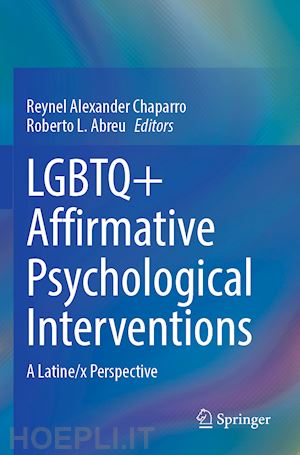
Questo prodotto usufruisce delle SPEDIZIONI GRATIS
selezionando l'opzione Corriere Veloce in fase di ordine.
Pagabile anche con Carta della cultura giovani e del merito, 18App Bonus Cultura e Carta del Docente
This book presents descriptions of interventions, results of empirical research, and theoretical contributions developed by Latine/x psychologists based on affirmative approaches aimed at promoting acceptance and understanding of LGBTIQ+ people. Contributions in this volume bring together the work of Latine/x scholars, practitioners, and activists across five Latin American countries or territories (Argentina, Chile, Colombia, Mexico, and Puerto Rico) and in the United States, in an effort to provide multicultural perspectives to LGBTIQ+ affirmative psychological interventions that highlight local, regional and national particularities. Chapters in this volume go beyond contributions made by applied psychology fields (e.g., clinical and counselling psychology), where affirmative orientations are predominantly located, and include contributions from other fields of psychological research such as social and community psychology.
The book is divided in two parts. Chapters in the first part focus on the experiences of trans and gender non-conforming people, with emphasis on contemporary systemic issues that affect gender identity among Latine/x communities and those who do not conform to hegemonic narratives about gender. Chapters in the second part focus on sexual identity among Latine/x LGBTIQ+ people and their families and communities. Contributions in this part present discussions about sexual orientation (grouped in LG/LGB identities), sex and gender dissidence, and the inclusion of intersex.
LGBTQ+ Affirmative Psychological Interventions: A Latine/x Perspective will be of interest to both researchers and practitioners in different fields of psychology – such as clinical, counselling, social, and community psychology – interested in a multicultural perspective to understand and develop LGBTQ+ affirmative actions to fight against the repathologization of individuals, groups, families and diverse communities.Reynel Alexander Chaparro (él/him/his) holds a PhD in psychology from the National University of Colombia. He created the student group Psychological Intervention and Sexual Diversity in which community intervention projects were developed, on topics related to sexual orientations, gender identities and the link between religion - spirituality and sexual diversity. His work has been focused on the understanding of sexual and gender diversities, as well as LGBTIQ+ identities, and their dynamics in different contexts of health intervention, both in Colombia and Brazil (NUH - Research Group in Human Rights and LGBTI citizenship in the Federal University of Minas Gerais). Since 2016, he is the representative of the Colombian College of Psychologists (COLPSIC) in IPsyNet, the International Psychology Network for Lesbian, Gay, Bisexual, Transgender and Intersex Issues, of the American Psychological Association (APA). Since 2022, he is working as a mental health therapist in Washington State USA, with a special focus on multicultural, BIPOC and local Latine/x communities.
Roberto L. Abreu (he/him/él) is an assistant professor of Counseling Psychology and the director of the Collective Healing and Empowering VoicEs through Research and Engagement (¡Chévere!) in the Department of Psychology at the University of Florida (UF). He is also an affiliate faculty in Center for Latin American Studies, and the Center for Gender, Sexualities and Women’s Studies Research at UF. His research explores ways in which marginalized communities resist systemic oppression and promote bienestar colectivo (collective well-being). Specifically, Roberto's work has made significant contributions in two areas: (a) intersection of Latine/x lesbian, gay, bisexual, transgender, and queer (LGBTQ) youth and their families and communities, and (b) transgender and gender diverse (TGD) youth and their families and communities. Roberto’s work is guided by social justice values such as person-environment interactions, growth, resilience, and resistance. His work can be found in journals such as the American Psychologist (AP), Journal of Counseling Psychology (JCP), The Counseling Psychologist (TCP), Psychology of Sexual Orientation and Gender Diversity (PSOGD), International Journal of Transgender Health (IJTH), Journal of Latinx Psychology (JLP), and Journal of Clinical Child & Adolescent Psychology (JCCAP), among others. Roberto currently serves as Associate Editor for Journal of Prevention and Health Promotion (JPHP) and Qualitative Psychology (QP).











Il sito utilizza cookie ed altri strumenti di tracciamento che raccolgono informazioni dal dispositivo dell’utente. Oltre ai cookie tecnici ed analitici aggregati, strettamente necessari per il funzionamento di questo sito web, previo consenso dell’utente possono essere installati cookie di profilazione e marketing e cookie dei social media. Cliccando su “Accetto tutti i cookie” saranno attivate tutte le categorie di cookie. Per accettare solo deterninate categorie di cookie, cliccare invece su “Impostazioni cookie”. Chiudendo il banner o continuando a navigare saranno installati solo cookie tecnici. Per maggiori dettagli, consultare la Cookie Policy.